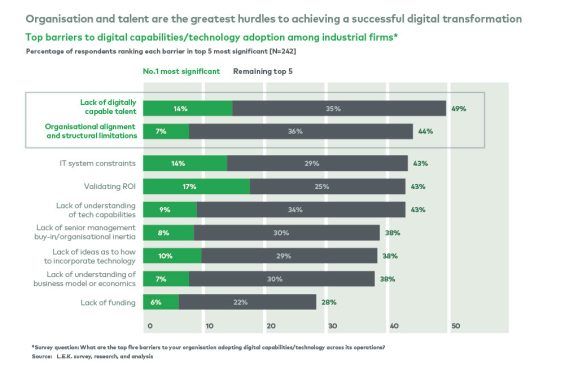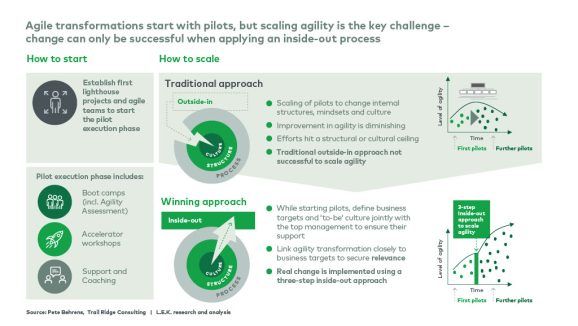How to design a successful digital transformation

John E. Kaye
- Published
- Home, Technology

By addressing the three critical aspects of Strategy, People and Technology in a coordinated way, your tech transition need not be a rocky ride, say Sebastian Olbert and Phil Roux of L.E.K. Consulting
As Charles Darwin once said: “It is not the strongest of the species that survives, nor the most intelligent. It is the one most adaptable to change.” And as the pace of change moves ever faster across the business, social and political environments, transformation is crucial for any organisation looking to thrive.
Effective business transformation significantly accelerates change, helping organisations achieve specific financial/strategic goals, adapt to or address competitive pressures, and address critical performance issues, quickly and effectively.
Digital transformation unlocks value creation opportunities (and addresses competitive threats) created by digital technologies. In L.E.K. Consulting’s view, digital needs to be clearly defined as one of four areas:
- Digital customer engagement
- Digital products and services
- Digital ways of working
- Digital operations
The challenge is that despite significant progress in technology and digital applications over recent decades, there has in fact been little improvement in productivity. This is the result of:
- Lack of understanding of how technology investments create value
- Key stakeholder scepticism and a fear about how technology will impact day-to-day life
- Leading to businesses finding success in the pilot phase but then failing to scale up
Many companies are trying to embrace “digital” – developing digital strategies and new business models and experimenting with new technology solutions. But without a clear plan and ability to execute, 84% of initiatives never get beyond the pilot stage. To be successful, pilots and strategies need to be actionable in a digital world, accepted by the employees and wired into the organisation.
A digital transformation is a large-scale behavioural/cultural change programme that takes time, engagement and lots of patience and endurance. This definition is supported by our own proprietary research on the factors that drive digital success for industrial firms, with organisation and talent cited as the greatest hurdles to achieving successful digital transformation.
Three ingredients for success
A holistic transformation impacts the entire organisation. To be successful, it takes focus on a winning trio of business strategy, people, and technology to bring innovation to life at scale and deliver superior economic results.
Basic economic principles don’t change just because we are talking about digital – the focus is always on creating value and delivering on business objectives. Therefore, a digital transformation always needs to be linked closely to the company’s strategy.
- Where to play – new digital products and services
- How to win – improved customer value proposition and competitive edge
- How to configure – improved productivity and cost efficiency
Secondly, you need to create a digitally-ready organisation. For the most part, the people factor is about changing the way people work and behave. This takes time and focused effort, as technology development and data generation always outpace an organisation’s ability to absorb them. Company leaders need to act as coaches, helping everybody understand the value of digital and how it can be exploited, and creating a culture of innovation and continuous improvement.
Digitisation must be made tangible, fears dealt with properly and the process fully supported; digitisation cannot simply be talked into existence. Transforming the operating model – including, over time, the overall governance structure – is essential.
Finally, technology is a key enabler to achieve strategic business targets, but it’s not the silver bullet that solves all the problems. Companies need to consider whether to develop technology as a core capability or through partnerships. But technology does need to always have a seat at the table.
Three steps to transformation
To transform a business and make it competitive in a digital world, all leaders need to continually innovate, operationalise and enable. To innovate, leaders need to jointly agree and set the direction of travel, with clarity on business goals and realistic digital ambition levels. L.E.K.’s industry-specific digital maturity assessment framework can help facilitate this important process.

“Transformation needs to happen from the inside out, not the outside in“
Top-down management approaches fall short – the organisation is the real innovation engine, and energy and innovation need to be freed up across the organisation. Our digital boot camps highlight the possibilities of digital technologies and help people see those possibilities in their day-to-day work.

Theoretical ideas always need to be tested. Organisations should be agile, but this needs definition. If all is clear, well defined and efficient, then continue ahead. But if the road is unclear, be agile and adapt. This helps balance new ways of working with existing strengths.
To create value at scale, you need to operationalise and enable. Operationalisation means shifting the focus away from innovation to execution. A good transformation programme will accelerate the speed of change. Digital playbooks for new models and processes will provide guidance. Enabling demands:
- Employee training
- Investment in the right, often new, capabilities
- Change management and (over-)communication
Avoid flying in circles
Many companies remain stalled in “pilot purgatory”. Discrete pilots often lead to success, but they don’t impact the organisation’s core – the real challenge is to scale. Company leaders often think that more and more pilots bring more and more new ways of working. This is a fallacy – transformation needs to happen from the inside out, not the outside in.
Scaled transformation demands readjustment of governance structures, KPI systems, incentive systems, etc. We call this “breaking through the organisational ceiling”.
The pace and success of a transformation are driven by digital readiness, an inside-out approach, leadership commitment, and sufficient resourcing and focus. L.E.K. is a trusted partner, helping clients to:
- Maintain focus on creating value and meeting strategic objectives
- Build commitment by co-creating solutions
- Develop the capability to make transformation happen
ABOUT THE AUTHORS


Phil Roux and Sebastian Olbert are Partners in the Organisation & Performance practice at global strategy consulting firm L.E.K. Consulting.

Further information
RECENT ARTICLES
-
 Europe eyes Australia-style social media crackdown for children
Europe eyes Australia-style social media crackdown for children -
 Europe opens NanoIC pilot line to design the computer chips of the 2030s
Europe opens NanoIC pilot line to design the computer chips of the 2030s -
 Building the materials of tomorrow one atom at a time: fiction or reality?
Building the materials of tomorrow one atom at a time: fiction or reality? -
 Universe ‘should be thicker than this’, say scientists after biggest sky survey ever
Universe ‘should be thicker than this’, say scientists after biggest sky survey ever -
 Lasers finally unlock mystery of Charles Darwin’s specimen jars
Lasers finally unlock mystery of Charles Darwin’s specimen jars -
 Women, science and the price of integrity
Women, science and the price of integrity -
 Meet the AI-powered robot that can sort, load and run your laundry on its own
Meet the AI-powered robot that can sort, load and run your laundry on its own -
 UK organisations still falling short on GDPR compliance, benchmark report finds
UK organisations still falling short on GDPR compliance, benchmark report finds -
 A practical playbook for securing mission-critical information
A practical playbook for securing mission-critical information -
 Cracking open the black box: why AI-powered cybersecurity still needs human eyes
Cracking open the black box: why AI-powered cybersecurity still needs human eyes -
 Tech addiction: the hidden cybersecurity threat
Tech addiction: the hidden cybersecurity threat -
 Parliament invites cyber experts to give evidence on new UK cyber security bill
Parliament invites cyber experts to give evidence on new UK cyber security bill -
 ISF warns geopolitics will be the defining cybersecurity risk of 2026
ISF warns geopolitics will be the defining cybersecurity risk of 2026 -
 AI boom triggers new wave of data-centre investment across Europe
AI boom triggers new wave of data-centre investment across Europe -
 Make boards legally liable for cyber attacks, security chief warns
Make boards legally liable for cyber attacks, security chief warns -
 AI innovation linked to a shrinking share of income for European workers
AI innovation linked to a shrinking share of income for European workers -
 Europe emphasises AI governance as North America moves faster towards autonomy, Digitate research shows
Europe emphasises AI governance as North America moves faster towards autonomy, Digitate research shows -
 Surgeons just changed medicine forever using hotel internet connection
Surgeons just changed medicine forever using hotel internet connection -
 Curium’s expansion into transformative therapy offers fresh hope against cancer
Curium’s expansion into transformative therapy offers fresh hope against cancer -
 What to consider before going all in on AI-driven email security
What to consider before going all in on AI-driven email security -
 GrayMatter Robotics opens 100,000-sq-ft AI robotics innovation centre in California
GrayMatter Robotics opens 100,000-sq-ft AI robotics innovation centre in California -
 The silent deal-killer: why cyber due diligence is non-negotiable in M&As
The silent deal-killer: why cyber due diligence is non-negotiable in M&As -
 South African students develop tech concept to tackle hunger using AI and blockchain
South African students develop tech concept to tackle hunger using AI and blockchain -
 Automation breakthrough reduces ambulance delays and saves NHS £800,000 a year
Automation breakthrough reduces ambulance delays and saves NHS £800,000 a year -
 ISF warns of a ‘corporate model’ of cybercrime as criminals outpace business defences
ISF warns of a ‘corporate model’ of cybercrime as criminals outpace business defences



























